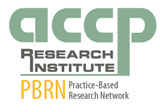
The results of the Medication Error Detection, Amelioration, and Prevention (MEDAP) Study were presented in the Scientific Poster Session II at the ACCP Annual Meeting in Pittsburgh, Pennsylvania, on October 18, 2011. The MEDAP Study abstract appears below. A copy of the MEDAP Study poster may be viewed by visiting the ACCP Research Institute Web site at www.accpri.org.
Medication Errors Reported by U.S. Clinical Pharmacists: The ACCP PBRN MEDAP Study
Grace M. Kuo, Pharm.D., MPH, Ph.D.,1 Daniel Touchette, Pharm.D., M.A.,2 and Jacqueline S. Marinac, Pharm.D.3
1UCSD, La Jolla, CA.
2University of Illinois at Chicago, Chicago, IL.
3ACCP Research Institute, Lenexa, KS.
Purpose: Clinical pharmacists perform many tasks related to medication error (ME) detection, amelioration, and prevention. However, a national study that systematically describes these interventions had not, until now, been reported. One of our study objectives was to describe MEs and clinical pharmacist interventions within a national clinical pharmacist practice-based research network (PBRN).
Methods: Clinical pharmacists were recruited from the ACCP PBRN to report their interventions to detect, ameliorate, and prevent MEs during a 14-consecutive day period in 2010. Participating pharmacists viewed online training materials about reporting MEs and the data collection tool. Institutional review board approval was obtained from AAFP first and then from local institutions as needed.
Results: Seventy-one individual pharmacists submitted 924 reports; however, only 782 reports had complete ME data. Medication errors occurred in the inpatient (61%), outpatient (29%), home (7%), and other (3%) settings. Therapeutic categories associated with MEs often reported were systemic anti-infective (25%), hematologic (21%), and cardiovascular (19%) medications. The top 5 most frequently reported medications were antibiotics (n=172), oral anticoagulants (n=76), injectable anticoagulants (n=68), β-blockers (n=37), and insulin (n=29). Most MEs (95%) did not result in patient harm; however, MEs resulted in temporary harm (n=33), permanent harm (n=6), harm requiring interventions to sustain life (n=2), and death (n=1). The reported MEs were caused by prescribing (54%), dispensing (10%), administering (13%), monitoring (13%), documenting (7%), and miscellaneous (3%) errors. Pharmacist interventions included communication (54%), medication change (35%), and monitoring (9%). Prescribers accepted about 82% of pharmacist recommendations (4% with modifications, 52% without modifications, and 26% because of pharmacist prescriptive authority).
Conclusion: Most MEs reported by U.S. clinical pharmacists did not result in patient harm; however, there were reports of severe harm and death. Half of the MEs detected were prescribing errors. Prescribers accepted most pharmacist recommendations to prevent or ameliorate MEs.
The ACCP PBRN is grateful for the contributions of the following clinical pharmacists who participated in the Medication Error Detection, Amelioration, and Prevention (MEDAP) Study.
- Nicole Acquisto, Pharm.D.
- Brooke Baltz, Pharm.D.
- Kimberly Benner, Pharm.D., BCPS
- Suzanne Bollmeier, Pharm.D., BCPS, AE-C
- Jill Burkiewicz, Pharm.D., BCPS
- Kara Canty, Pharm.D.
- Kathryn Connor, Pharm.D., BCPS, BCNSP
- Brian Cryder, Pharm.D.
- Alicia Cymbala, Pharm.D., BCPS
- Lea Dela Pena, Pharm.D., BCPS
- Tina Denetclaw, Pharm.D., BCPS
- Anne Denham, Pharm.D., BCPS
- Erica Dobson, Pharm.D.
- Jennifer Dugan, Pharm.D., BCPS
- Margaret Felczak, Pharm.D., BCPS
- Jared Freml, Pharm.D., BCOP
- Cari Friesleben, Pharm.D., BCPS
- Maria Giannakos, Pharm.D., MBA, BCPS
- Christine Grenier, Pharm.D.
- Christine Groth, Pharm.D.
- Rebekah Hansmeier, Pharm.D., BCPS
- Heather Hazeldine, Pharm.D., BCPS
- Rachel Heilmann, Pharm.D.
- Olga Hilas, Pharm.D., BCPS, CGP
- Jeff Huntress, Pharm.D.
- Rob Hutchison, Pharm.D.
- Justine Janociak, Pharm.D.
- Katherine Juba, Pharm.D., BCPS
- Sarah Judd, Pharm.D.
- Amy Kauffman, Pharm.D., BCPS
- David Killough, Pharm.D.
- Mary Ann Kliethermes, Pharm.D.
- Kathy Komperda, Pharm.D., BCPS
- Don Lamprecht, Pharm.D., BCPS
- Lisa Lash, Pharm.D.
- David Lourwood, Pharm.D., FCCP, BCPS
- Jessica Morris, Pharm.D.
- Heather Nyman, Pharm.D., BCPS
- Nathan Painter, Pharm.D., CDE
- Adam Pesaturo, Pharm.D.
- Christy Pratt, Pharm.D.
- Jaymie Reiners, Pharm.D., BCPS
- Daniel Riche, Pharm.D., BCPS, CDE
- Heather Rouse, Pharm.D., BCPS
- Rochelle Rubin, Pharm.D., BCPS
- Kelly Rudd, Pharm.D., BCPS, CACP
- Leslie Ruppe, Pharm.D., BCPS
- Julie Sanchez, Pharm.D.
- Jennifer Schimmer, Pharm.D., BCPS
- Christie Schumacher, Pharm.D., BCPS
- Lisa Schwellenbach, Pharm.D., BCPS
- Marc Semprebon, Pharm.D.
- Paul Shaw, Pharm.D.
- Andrew Smith, Pharm.D., BCPS
- Sheila Stadler, Pharm.D., BCPS
- Kayla Stover, Pharm.D.
- Kory Vanderschaaf, Pharm.D.
- Erin Vogel, Pharm.D., BCPS
- Laurie Warrington, Pharm.D.
- Amanda Winans, Pharm.D.
- Daniel Witt, Pharm.D.
- Julie Wright Banderas, Pharm.D.